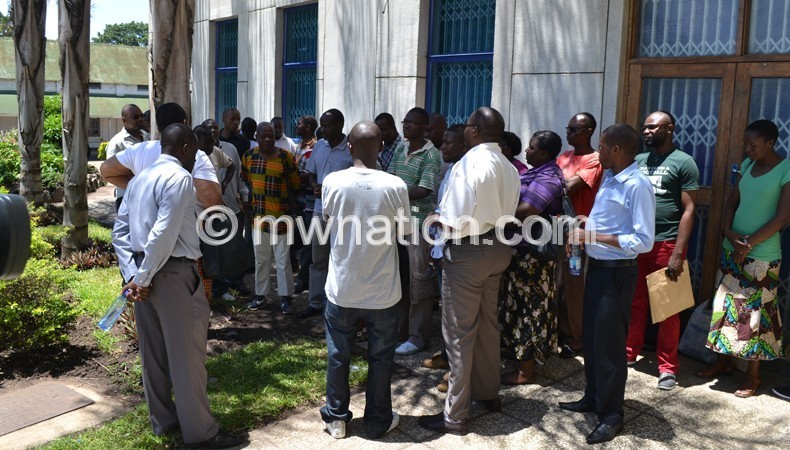APM reverses ACB seal order
Malawi President Peter Mutharika on Wednesday reversed an earlier order that sealed Anti-Corruption Bureau (ACB) offices nationwide amid a strike by staff at the graft-busting body.
The President’s order overturning the sealing of the offices in Blantyre, Lilongwe, Mzuzu and Zomba came barely hours after a legal scholar at Chancellor College, Mwiza Nkhata, and the Catholic Commission for Justice and Peace (CCJP), faulted the decision as lacking legal basis.

Both ACB director-general Lucas Kondowe and Chief Secretary to the Government George Mkondiwa confirmed the development, saying the ACB staff were already returning to work as of on Wednesday with police heading out.
Kondowe also confirmed that Mutharika was instrumental in shaping the events of on Wednesday.
According to Kondowe, following discussions with the Executive arm of government, which included giving the President a full briefing of the events, government ordered police at the bureau’s headquarters at City Centre in Lilongwe to leave the premises and allow staff representatives and management to discuss the matter.
He said: “We obtained clearance from government to meet the staff. We requested the staff to give dialogue a chance and I can confirm that we have subsequently resolved that the staff will suspend the strike temporarily.
“They will go back to work and some are already back at work. In return, government has agreed to end the sealing off of all offices. We have further agreed that on January 5 [2015] when the holiday will be over, negotiations will resume on the strike.”
However, Kondowe said the meeting did not attempt to address the specifics of the demands by the officers on strike as the major success was persuading the staff and government to compromise on their previous positions.
He reiterated his confidence that the strike and subsequent sealing off of the premises have not compromised the security of files under the bureau’s custody.
“The President has been particularly concerned by the various cases we were pursuing, especially the Cashgate cases so he was genuinely concerned by the strike,” added Kondowe.
On his part, Mkondiwa said the decision to withdraw the police followed the agreement, saying “they went there to protect the offices and now there is no need to.”
He added: “We will engage the staff through the negotiating team. We believe contact and dialogue will work. Of course, the President was involved.”
ACB staff are demanding 70 percent salary increment and have rejected the 10 percent raise offered by government.
However, Minister of Finance, Economic Planning and Development Goodall Gondwe is on record as having said that government has no money to finance increments. He said government is working on harmonising the salaries.
Currently, industrial strikes are bringing the economy to a near halt with the courts closed due to a strike by Judiciary support staff. Staff at University of Malawi’s (Unima) constituent colleges such as Chancellor College and College of Medicine are also on sit-in.
Observers see most of the strikes as coming from government’s decision to raise salaries of civil servants in the mainstream by an average 45 percent.
The President, the Vice-President and Cabinet ministers have already cancelled their proposed increments.






Has APM reversed the statement that ACB and Judiciary strikes are being promoted by JB?
This old senile man called APM is running our country on trial and error basis, closing offices today and opening them back again the day after. Almost 60% of the Civil servants are on strike and the first action we have seen coming from the president is to issue an order to seal offices of the ACB. Why is he so concerned with the ACB offices out of all the govt departments that are currently on strike, to the point of issuing a presidential order to seal the ACB offices. I hope this order was not due to concerns about the K92 billion cashgate investigation currently underway.
Sometimes I wonder whether our leaders are really chosen by God as we are always led to believe or are our leaders a result of regionalism politics that some quarters says is the main source of all the bad leaders we have had since the inception of multiparty politics in our beloved country.
But for the sake of argument, if indeed out leaders are chosen by God who we all believe is a good God who knows every person’s heart, how come that since 1994 all leaders we have had, have been; thieves, adulterers, nepotistic, liars, greedy etc. Does it mean that all Malawian politicians are worse so that God chooses the bad out the worst to be our leaders?